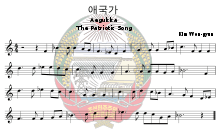Aegukka
"Aegukka" (Chosŏn'gŭl: 애국가, lit. '"Patriotism Song"') officially translated as the "Patriotic Song"[2] is the national anthem of North Korea. It was composed in 1945 as a patriotic song celebrating independence from Japanese occupation and was adopted as the state anthem in 1947.
| English: The Patriotic Song | |
|---|---|
| 애국가 | |
 Sheet music atop North Korean state emblem | |
National anthem of | |
| Also known as | (English: Song of a Devotion to a Country) |
| Lyrics | Pak Se-yong, 1946[1] |
| Music | Kim Won-gyun, 1945[1] |
| Adopted | 1947 |
| Audio sample | |
"Aegukka" (instrumental, one verse)
| |
| Aegukka | |
| Chosŏn'gŭl | |
|---|---|
| Hancha | |
| Revised Romanization | Aegukga |
| McCune–Reischauer | Aegukka |
Etymology
"Aegukka" is a Romanized transliteration of "The Patriotic Song"; the song is also known by its incipit Ach'imŭn pinnara or "Let Morning Shine"[1][3] or alternatively as the "Song of a Devotion to a Country".
The Encyclopedia of Korean Culture defines "Aegukka" as "the song to wake up the mind to love the country". "Aegukka" in itself is differentiated from a national anthem. While a national anthem or gukka (lit. 'country song') is an official symbol of the state, aegukka refers to any song, official or unofficial, that contains patriotic fervor towards its country, such as Hungary's "Szózat" or the U.S. "The Stars and Stripes Forever". However, the nationally designated "Aegukka" plays the role of symbolizing the country.[4][5] In general shorthand, the term aegukka refers to the national anthem of North Korea.[4]
History
Originally, the Korean exile government (1919–1945) in Shanghai, China adopted as their national anthem "Aegukga" (which has the same name with a different Romanization) to the tune of "Auld Lang Syne". After World War II, South Korea kept the words, put to a new tune (changed from "Auld Lang Syne"), while North Korea adopted this newly written piece in 1947.[3] The words were written by Pak Se Yong and the music was composed by Kim Won Gyun.[1]
In the early 1980s, Kim Jong Il sought to reduce the song's importance to the benefit of "Song of General Kim Il Sung".[7]
On official occasions, when only the first verse is performed, it is customary to repeat the last four bars. However, if both verses are performed, it is the last four bars of the second verse that are repeated instead.[8][9]
"Song of General Kim Il Sung" and "Song of General Kim Jong Il" have since taken the place of de facto national anthems domestically, and "Aegukka" is reserved for representing North Korea internationally: when foreign dignitaries visit the country or North Korean athletes compete at international sporting competitions.[10] Compared to other nations, the North Korean national anthem is not often performed inside the country (except for radio and television sign-off) and thus many North Koreans do not know the lyrics.[10]
"Aegukka" is almost unique among most North Korean patriotic songs, as it praises neither the Workers' Party of Korea, nor the Kim dynasty, but rather the whole of Korea itself.
"Aegukka" is played at the start of each of Korean Central Television's broadcast days.[11]
See also
Notes
References
- Hoare, James E. (2012-07-13). Historical Dictionary of Democratic People's Republic of Korea. Scarecrow Press. p. 273. ISBN 9780810879874. Retrieved 10 April 2017.
- "National Anthem of the DPRK". DPRK Today. Archived from the original on 12 February 2018. Retrieved 27 July 2018.
- Agency, Central Intelligence (2015-01-01). "KOREA, NORTH". The World Factbook. Masterlab. ISBN 9788379912131.
- "애국가". Academy of Korean Studies. Retrieved October 8, 2013.
- "애국가[愛國歌]". Doosan Coroporation. Retrieved October 8, 2013.
- Eddie Burdick (May 26, 2010). Three Days in the Hermit Kingdom: An American Visits North Korea. McFarland. p. 248. ISBN 978-0-7864-5653-6. Retrieved April 25, 2015.
- BlueMarbleNations (27 October 2011). "North Korean National Anthem - "Aegukka" (KO/EN)" – via YouTube.
- Military Parade Music (4 September 2015). "Military Music - North Korean National Anthem - "Aegukka"" – via YouTube.
- Lankov, Andrei (April 24, 2007). North of the DMZ: Essays on Daily Life in North Korea. McFarland. p. 38. ISBN 978-0-7864-5141-8. Retrieved August 31, 2016.
- https://www.youtube.com/watch?v=_OfKEbREFkI
Further reading
- Kim Il-sung (1980) [1946]. "To Create the National Anthem and the March of the People's Army: Talk with Writers" (PDF). Kim Il Sung: Works. 2. Pyongyang: Foreign Languages Publishing House. pp. 406–409. OCLC 827642144.
External links
| Look up 애국가 in Wiktionary, the free dictionary. |
- Lyrics in English at Naenara
- Lyrics in Korean at Naenara
- "Aegukka" (mp3) at Naenara